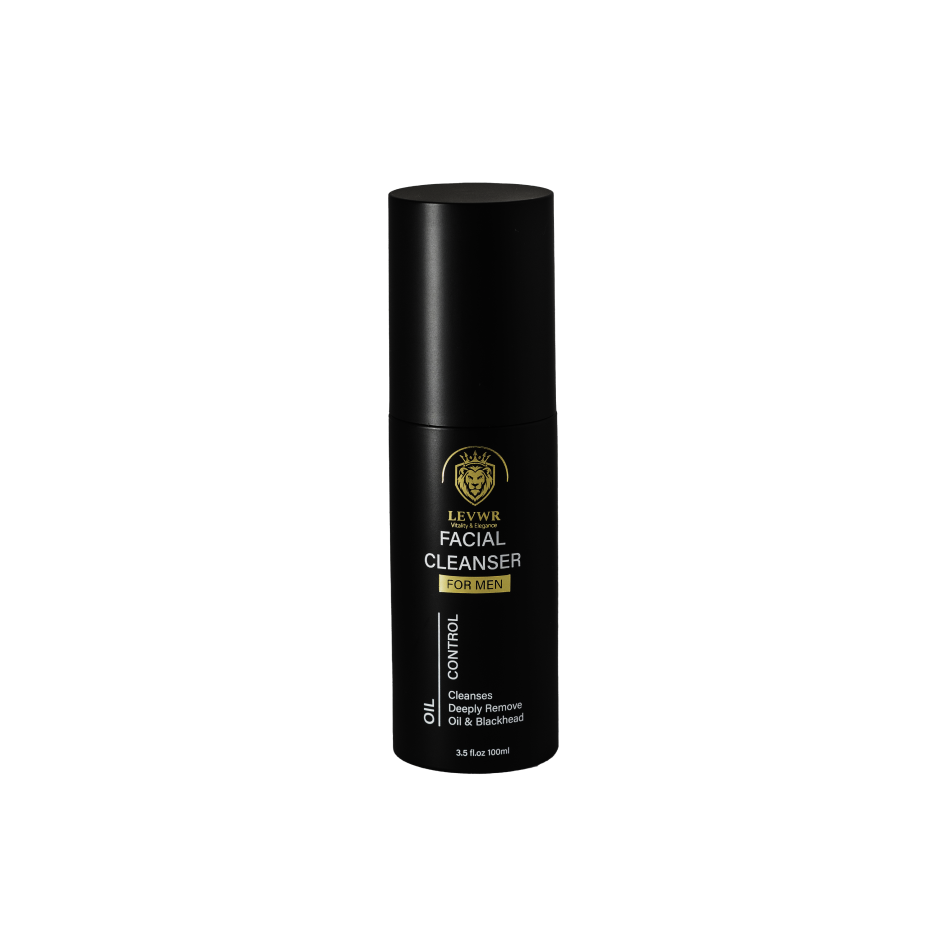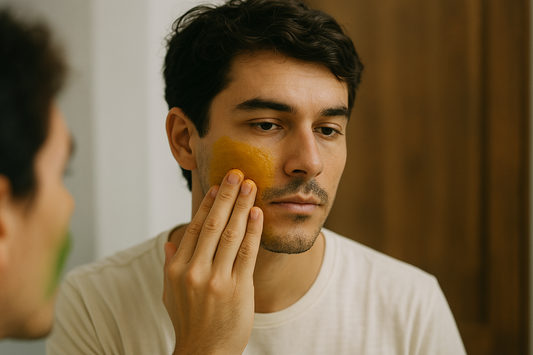Vitamin C in Skincare: Myths vs. Facts
2 mins read

Vitamin C has long been recognized as one of the most powerful ingredients in skincare. From brightening dull complexions to fighting signs of aging, it seems to do it all. But as its popularity grows, so do the myths and misunderstandings about how it works. Whether you're a skincare newbie or a seasoned pro, it's easy to get lost in the sea of information. So, let’s break down the facts and clear up the myths surrounding Vitamin C in skincare.
What is Vitamin C?
Before diving into the myths and facts, it’s important to understand what Vitamin C actually is. Also known as ascorbic acid, Vitamin C is a powerful antioxidant that helps protect the skin from free radicals, the unstable particles that damage skin cells. These free radicals are often caused by environmental factors such as UV rays, pollution, and even stress. Vitamin C also plays a crucial role in collagen production, which is key to maintaining firm, youthful skin. More than 55% of individuals aged 50 and older purchase at least one Vitamin C skincare product, highlighting its importance in anti-aging and skincare routines.
Now, let’s take a closer look at the myths and the facts about Vitamin C in skincare.
Myth 1: Vitamin C Is Only for People with Dry Skin
Fact: Vitamin C benefits all skin types.
One of the most common myths about Vitamin C is that it’s only suitable for people with dry skin. While it’s true that Vitamin C is hydrating, it’s also packed with antioxidants that work for every skin type. Whether you have oily, combination, or sensitive skin, Vitamin C can still be an excellent addition to your skincare routine.
For those with oily skin, Vitamin C can help regulate sebum production and reduce inflammation, making it an ideal choice. For people with sensitive skin, forms of Vitamin C, like sodium ascorbyl phosphate, are less likely to cause irritation. So no matter your skin type, Vitamin C can benefit you.
Myth 2: All Vitamin C Serums Are the Same
Fact: Not all Vitamin C products are created equal.
While Vitamin C is a powerhouse ingredient, not all products containing it are equally effective. The key to its effectiveness lies in the concentration and the formulation. The most common form of Vitamin C in skincare is L-ascorbic acid, which is the most powerful but can also be unstable. If exposed to air or light, it can break down quickly and lose its effectiveness. Look for products in dark-colored packaging and those stored in air-tight containers to ensure the Vitamin C remains active.
Concentrations of Vitamin C in skincare products can differ, with most products containing between 10-20% ascorbic acid. Higher concentrations aren’t always better, and they can even cause irritation if your skin is sensitive. It’s always a good idea to start with a lower concentration and see how your skin reacts.
Myth 3: Vitamin C Will Make Your Skin More Sensitive to the Sun
Fact: Vitamin C can actually protect against sun damage.
There’s a myth that using Vitamin C can increase your skin’s sensitivity to the sun, but the truth is, Vitamin C can actually help protect your skin from sun damage. As an antioxidant, Vitamin C neutralizes free radicals that are generated by UV exposure, helping to prevent premature aging and skin damage. While it’s not a replacement for sunscreen, using Vitamin C in combination with SPF can enhance your skin’s protection against UV rays.
However, if you have sensitive skin, it’s essential to wear sunscreen daily, especially when using Vitamin C, as it can still cause some irritation for certain skin types. Always ensure you apply sunscreen with broad-spectrum protection to protect your skin.
Myth 4: You Can Only Use Vitamin C in the Morning
Fact: You can use Vitamin C both morning and night.
It’s often recommended to use Vitamin C in the morning to take advantage of its ability to protect against environmental damage. However, you can use Vitamin C both during the day and at night. The key is how your skin responds to it and the other products in your routine.
Vitamin C works best when paired with other antioxidants, like Vitamin E, or when used alongside peptides and hyaluronic acid for additional hydration and skin barrier support. If you're using Vitamin C in the evening, it can help repair damage from environmental stressors gathered throughout the day.
Myth 5: Vitamin C Will Completely Erase Dark Spots and Hyperpigmentation
Fact: Vitamin C can help lighten dark spots, but it won't work overnight.
Vitamin C is known for its ability to brighten the complexion and lighten dark spots or hyperpigmentation. However, it's important to have realistic expectations. While Vitamin C can help to fade pigmentation over time, it won't erase dark spots overnight. Consistency is key, and you can expect to see noticeable results after several weeks of regular use. Pairing Vitamin C with other treatments like niacinamide or retinoids can also help speed up the process.
Additionally, dark spots caused by sun damage can take longer to fade, as they are often deeper within the skin. So, while Vitamin C can help lighten these spots, it may not completely remove them.
Myth 6: Higher Concentrations of Vitamin C Are Always Better
Fact: Higher concentrations can cause irritation, especially for sensitive skin.
It’s a common assumption that the higher the concentration of Vitamin C, the better the results. While higher concentrations of Vitamin C (such as 20% or more) may seem like a quick fix for skin issues, they can cause irritation, especially for those with sensitive skin. If you’re new to Vitamin C, it’s best to start with a lower concentration (10% or lower) and slowly increase it over time. This will give your skin a chance to adjust and prevent any unwanted irritation or redness.
Also, keep in mind that the effectiveness of Vitamin C isn’t only dependent on its concentration. The stability of the formula, its pH level, and how it interacts with other ingredients all play a role in how well it works.
Myth 7: Vitamin C Can Be Used with Retinol Without Any Issues
Fact: Combining Vitamin C with retinol can cause irritation for some people.
Both Vitamin C and retinol are powerful ingredients known for their anti-aging benefits. However, combining them in a skincare routine can be a bit tricky. Vitamin C works best in a low pH environment, while retinol requires a more neutral pH to be effective. Using them together can sometimes cause irritation, dryness, or redness for certain skin types, especially if you're new to these ingredients.
If you want to incorporate both Vitamin C and retinol into your routine, consider using them at different times of the day (Vitamin C in the morning and retinol at night) or on alternate days to reduce the risk of irritation.
Vitamin C is an essential ingredient in any skincare routine due to its impressive antioxidant properties and its ability to brighten the skin and fight signs of aging. However, with so many myths circulating about its use, it’s important to separate fact from fiction to get the best results.
At Levwr, we recommend always choosing a stable form of Vitamin C and starting with a lower concentration. By following these simple steps, you can unlock the full benefits of this powerhouse ingredient and achieve glowing, healthy skin.

Purifying Facial Cleanser
$47.25
A foaming cleanser that removes impurities and excess oil while preserving the skin's natural moisture. This gentle yet effective formula prepares the skin for optimal absorption of subsequent treatments.
-

The Power of Nature: Top Skincare Natural Ingre...
When it comes to skincare, everyone wants healthier, glowing skin, and that often means trying different products and ingredients. In recent years, natural skincare has become more popular because it...
The Power of Nature: Top Skincare Natural Ingre...
When it comes to skincare, everyone wants healthier, glowing skin, and that often means trying different products and ingredients. In...
Read More
-

Vitamin C in Skincare: Myths vs. Facts
Vitamin C has long been recognized as one of the most powerful ingredients in skincare. From brightening dull complexions to fighting signs of aging, it seems to do it all....
Vitamin C in Skincare: Myths vs. Facts
Vitamin C has long been recognized as one of the most powerful ingredients in skincare. From brightening dull complexions to...
Read More
-

Causes of Dandruff in Men? Understanding the Tr...
Dandruff is a common scalp condition that affects millions of people worldwide, and it’s no surprise that men are particularly prone to it. Whether you're experiencing flakes in your hair,...
Causes of Dandruff in Men? Understanding the Tr...
Dandruff is a common scalp condition that affects millions of people worldwide, and it’s no surprise that men are particularly...
Read More
- Choosing a selection results in a full page refresh.
- Opens in a new window.


